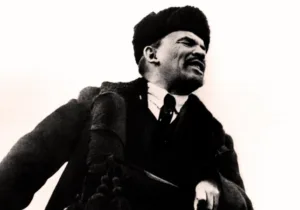At the moment of her father’s death, Josef Stalin’s daughter recalled: “He suddenly lifted his left hand as though he were pointing to something above and bringing down a curse on us all. The gesture was incomprehensible and full of menace, and no one could say to whom or at what it might be directed. The next moment, after a final effort, the spirit wrenched itself free of the flesh.”
Some accounts of Stalin’s 1953 death claim he angrily murmured about wolves. But Joshua Rubenstein’s new book The Last Days of Stalin mention no audible last words, just gurgling & the malevolent glance. The tyrant and mass murderer had, before discovered by a terrified maid and guards, lain for many hours on his dacha floor, his pajamas urine soaked. His equally terrified Politburo henchmen, when summoned, only had him lifted to a sofa, calling no doctors.
When physicians finally came, naturally also terrified, they fumbled and dallied. Likely nothing would have saved Stalin from his grim demise after this severe stroke, but the negligence and delays were emblematic of the terror state Stalin created. That he himself at his greatest vulnerability was ultimately victimized by its cruelty seems somehow appropriate.
The final months of Stalin’s rule featured his invention of a Jewish Doctors Plot aimed at Soviet elites, accompanied by anti-Semitic salvos in Soviet media. Ironically, some of the imprisoned Jewish doctors were later, in their cells, consulted about Stalin’s stroke. He may have plotted a more widespread and sinister anti-Jewish campaign, perhaps even a mass expulsion of Soviet Jewry to Siberia. Rubenstein admits there’s no documentation for such a plan but speculates the trajectory of the public campaign pointed in dire directions. Stalin’s anti-Jewish mindset maybe was ignited by Soviet Jewry’s warm welcome of Israeli Foreign Minister Golda Meir to Moscow in 1948, a welcome he jealously saw as evidence of divided Jewish loyalties. His death possibly saved Soviet Jewry, which had barely survived Hitler’s invasion, from yet one more catastrophe, and as such, was potentially providential.
Certainly Stalin’s death was providential for millions who labored in his network of Siberian slave labor camps. Some celebrated when they heard. Eventually millions would be freed, as Stalin’s successors dismantled some of his most draconian repressions even as they retained a one party police state. The Politburo survivors, having escaped countless Stalin purges, had lived on precariously thin red ice for two or more decades, never knowing if their drunken late night dinners with their master would be their last. They understandably moved fairly quickly to exterminate their colleague who had been Stalin’s chief secret policeman, jailer, torturer and executioner, Lavrenti Beria.
As Stalin’s daughter noticed, Beria at Stalin’s deathwatch had openly exulted when Stalin seemed to slip away only then to feign grief during brief moments of seeming recovery. Beria was jubilant after the death and presumed power would be his, not shrewd enough to realize that his own destruction was now in everyone’s interest. From his jail cell, he pathetically pleaded and proffered apologies, unaware of the irony that so many of his victims had been similarly desperate.
Stalin’s funeral prompted massive outpourings of Soviet grief, much of it genuine for the mustached monster who had so completely throttled their nation for a quarter century. Many of his enslaved subjects loved him as debased children and spouses often revere their domestic abuser. Scores and perhaps hundreds were crushed or trampled by funeral throngs in Moscow, the final victims of Stalin’s blood-soaked reign. While other Communist rulers dutifully attended, Mao notably did not, signaling his emerging independence and eventual estrangement.
During Stalin’s demise and after his death, old summit partners and nemeses Churchill and Truman publicly expressed oddly affectionate good wishes. Some governments like India’s obsequiously honored his death as though for a champion of humanity. Stalin’s illness prompted a coyly phrased public prayer from the Eisenhower administration for the officially atheist Soviet people. Ike privately complained that the U.S. government, for all its vast resources, had developed no plan for responding to and exploiting Stalin’s death.
Rubenstein’s book suggests, without fully advocating, that Stalin’s death offered a brief opportunity for rapprochement with the West, which Eisenhower neglected to exploit. John Foster Dulles, often lampooned as obtusely anti-Soviet, is typically faulted for preventing any diplomatic exploration. An aging Churchill had dreamed that his final days of power could feature peacemaking with Stalin, or his successors, to no avail.
Khrushchev and the Politburo, as they began to dismantle some of Stalin’s terror apparatus, sometimes hinted at overtures of coexistence. If sincere, the opening was brief. Within months, the post-Stalin rulers would brutally suppress an uprising in East Germany. The pretext for destroying Beria was an allegation he had advocated German reunification. Once solidifying his own power, Khrushchev would denounce Stalin’s terror in a famous private speech for party insiders in 1956 that eventually became public and astounded the world. There would be no return to the worst days of Stalin’s paranoia.
Stalin’s daughter would eventually escape the Soviet Union and become a Christian, albeit a tormented and tragic one who never fully found peace or reckoned with the enormity of her father’s crimes. Her recall of the demonic last gaze and curse from his deathbed would haunt her as his murderous legacy still haunts Russia.






